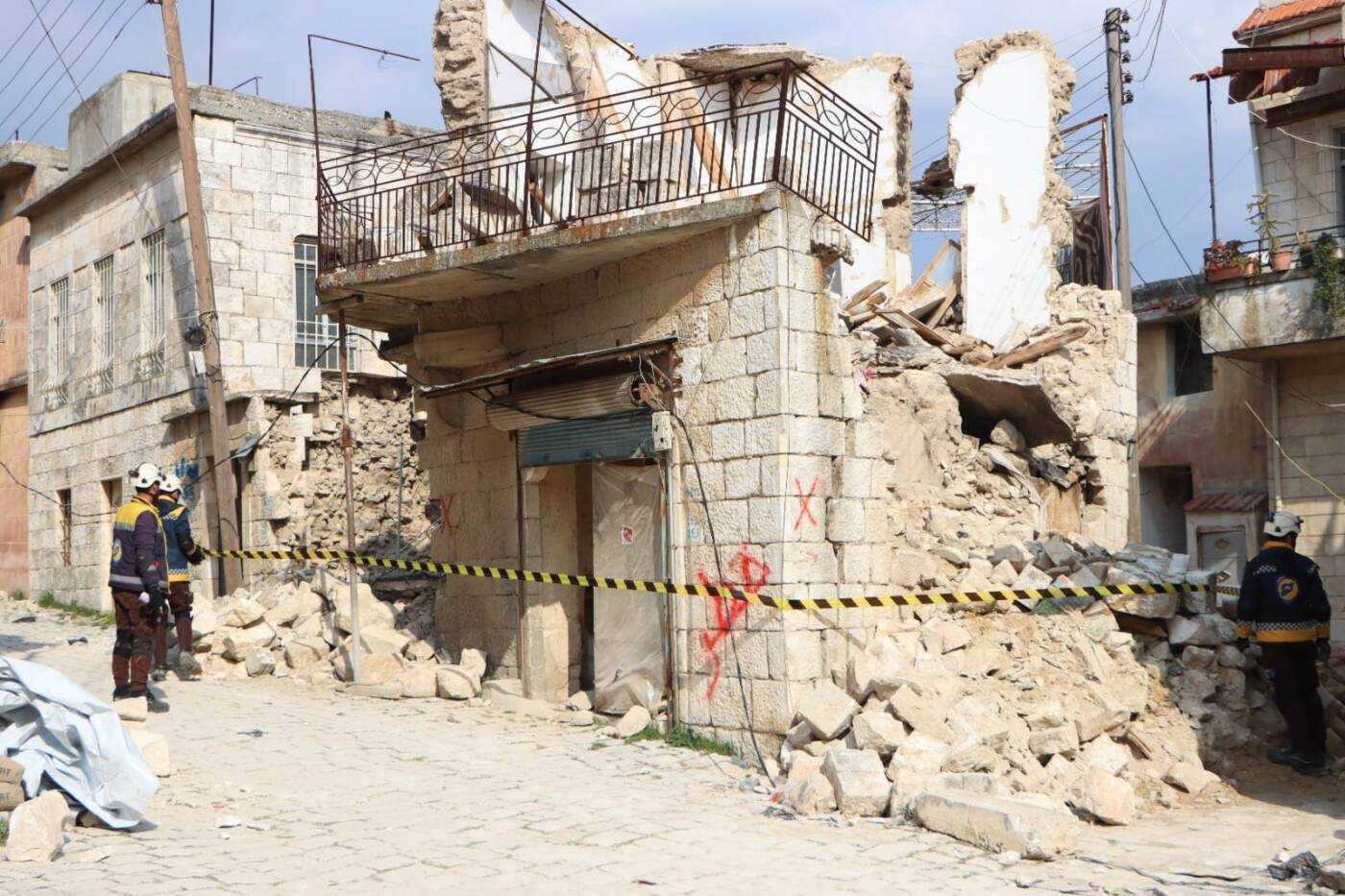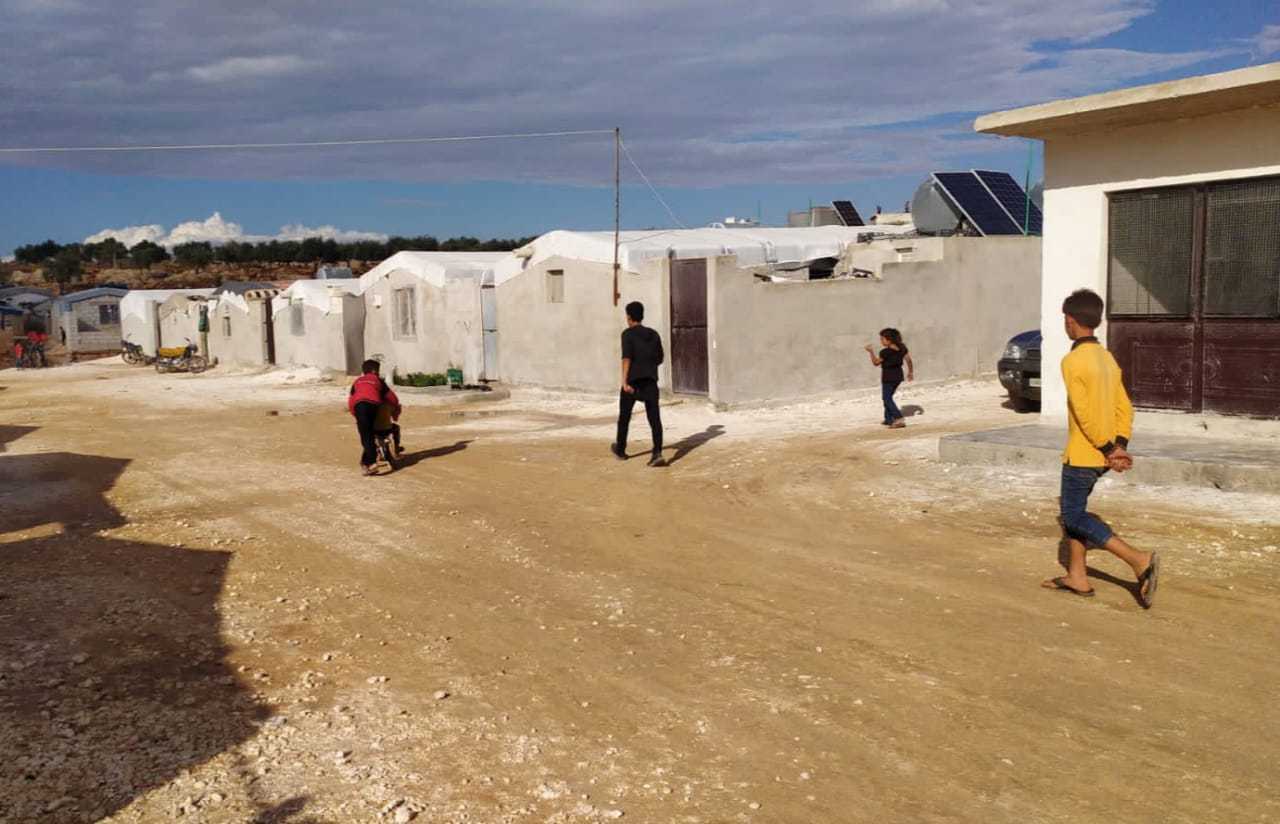Eight months later, northern Syria’s earthquake victims unable to rebuild
Nearly eight months after the devastating February 6 earthquake displaced hundreds of thousands of people in northwestern Syria alone, few have been able to rebuild.
2 October 2023
IDLIB — In the Idlib countryside city of Salqin, Nour Aktaa, 25, starts every day at his new workplace with a ritual as essential as his daily Quran recitation: Scrolling through photos of what what was once his home and barbershop, both reduced to rubble by the February 6 earthquake.
Bitterly, he sifts through memories of his family’s four-story house, which included his barbershop. When the earthquake struck, it was all destroyed. His father was one of thousands of people killed by the disaster in northwestern Syria and southern Turkey.
It has been nearly eight months since the 7.7-magnitude earthquake struck, killing more than 53,000 people in both countries and displacing approximately 311,000 people in northwestern Syria alone. Today, some left homeless by the disaster, like Aktaa, feel that responding to the aftermath of the earthquake is no longer a priority for humanitarian organizations and the media.
Aktaa, his mother and sister lived in temporary shelters for three months following the earthquake. Eventually, he had to “rent a house in Salqin from a relative for $40 a month, which is after a discount.” Suddenly, he found himself bearing financial burdens he never anticipated before that day in February, which he called “one of the worst days of my life.”
Ongoing suffering
In the first months after the earthquake, victims had hope that local authorities or humanitarian organizations would restore or rebuild their houses, along the lines of the Turkish government’s support for its citizens.
However, reconstruction efforts so far have fallen short of what is needed to address the scale of the disaster, a number of those affected told Syria Direct. They called on the Hayat Tahrir al-Sham (HTS)-backed Syrian Salvation Government (SSG) in Idlib, as well as organizations, to take action to address their ongoing suffering since the earthquake.
Commenting on that, the director of the SSG’s Department of Earthquake Victims’ Affairs, Ammar al-Najjar, told Syria Direct his government “continues to build concrete housing blocks in certain areas of the Idlib province. in cooperation with humanitarian partners.”
Approximately 64,000 families in HTS-held areas were displaced by the earthquake, according to SSG figures. Most now live in camps spread throughout the area,while others have rented undamaged homes within affected cities or in nearby unaffected cities and villages.
In SSG-controlled areas, the February earthquake damaged about “18,045 houses, some of which were completely or partially destroyed, including 2,420 on the verge of collapse,” al-Najjar said. “More than 9,000 had cracks in need of restoration, 4,830 were partially damaged and 1,415 were completely destroyed,” he added, noting that SSG personnel “in collaboration with humanitarian partners, identified 47,263 damaged homes in Idlib province after the disaster.”

Members of the Syrian Civil Defense (White Helmets) place warning signs on a building destroyed by the February 6 earthquake in the countryside of the Idlib province town of Jisr al-Shughour, 02/23/2023 (Syrian Civil Defense)
The true scale of the damage across areas of Idlib and northern Aleppo controlled by both HTS and the opposition Syrian National Army (SNA) goes beyond those figures. More than 334,821 families were impacted—a total of more than 1.8 million people, according to an April report by the Syrian Response Coordination Group. Some 48,000 families were displaced, a total of 311,000 people, 67 percent of whom were women, children and those with health conditions.
A total of 2,171 buildings were destroyed during the earthquake, while 5,344 others were deemed unsafe for reoccupation and beyond reinforcement, according to the report. Assessments determined that these buildings ranged from severely damaged to requiring immediate demolition. Another 14,844 buildings with moderate damage required reinforcement to become safe for reoccupation.
Overwhelming burdens
Ansam al-Khaled, 33, was living in the Idlib countryside town of Barisha when the earthquake struck in February and reduced her home to ruins. The mother of three had previously been displaced from her hometown of Kafr Nubl, in southern Idlib. Displaced once more, she moved to a temporary shelter for earthquake victims, she told Syria Direct.
Al-Khaled teaches at a local school for $150 a month, but her salary “does not cover our basic needs, so moving to the camp was a better option than renting a house at my own expense” she said.
Rebuilding her home at her own expense is “impossible,” she said, estimating the cost at “over $1,000.” In its current state, the engineering teams in charge of damage assessment classified her residence as “uninhabitable without restoration.”
Local rents range from $30 to $200 per month, Raed al-Khatib, the owner of a real estate office in Idlib city, told Syria Direct. “Rents are on the rise in cities and villages where the earthquake caused minimal or no damage to the infrastructure,” he added.
In Idlib city, one of the areas least impacted by the February earthquake, “rents have gone up by 50 percent,” al-Khatib said. He attributed this to high demand for housing “in the city, since it suffered minimal damage, and the greed of some homeowners” looking to maximize profits.
The cost of construction materials also rose after the earthquake, according to Ahmad Karmo, who owns a construction workshop in Barisha, one of the villages impacted by the disaster. “The price of a ton of cement rose to $120—a $25 increase,” he told Syria Direct.
Nearly eight months after the earthquake, “restoration activity by homeowners is still weak,” Karmo added.
Feeble efforts
The SSG has so far provided alternative housing for 2,000 families out of the 64,000 families displaced by the earthquake, according to al-Najjar, from the Victims’ Affairs Department. Of those, “400 families were housed in mobile homes and 1,600 in concrete housing blocks,” he added.
Humanitarian organizations have also provided alternative housing for many other affected families. The Charitable Cooperation Association, for instance, “built 70 concrete blocks, each with an area of 16 square meters, to accommodate families whose homes were completely destroyed or who have members with disabilities,” al-Khaled, who received one of the units, told Syria Direct.
Violet Organization, another local humanitarian NGO, has put 23 families back in their homes in the western Idlib countryside after repairing them, according to Ahmad Qutaish, the coordinator of the organization’s emergency response projects in Idlib.
Violet “has undertaken several projects to restore earthquake-affected areas and support victims,” Qutaish told Syria Direct. These include the organization’s cash-for-work program, through which it employs beneficiaries “to remove and transport rubble and repair vital public facilities,” he added. Those projects included “rehabilitating the damaged bakery in Atma city and restoring water networks to assist local farmers in Salqin,” in addition to “repair projects focused on the most heavily damaged houses.”
In response to local sources who described the reduced involvement of local authorities supporting those affected by the earthquake, SSG official al-Najjar said “the construction of cement blocks continues, and specialized teams are actively conducting census operations and field investigations in affected areas.”
He explained that his government, in cooperation with humanitarian partners, is undertaking two rehousing projects in the northern Idlib countryside village of Kafr Jales. The first involves the construction of 500 apartments in single-story buildings. The second is to build 500 more apartments in two-story buildings, and 156 apartments in three-story buildings. He expected families not included in the first stage to be accommodated by the end of the year.
But as Aktaa cycles through the images of his destroyed home and shop every morning, he is uncertain whether he will receive support to find alternative housing or restore what he lost. The 200 Turkish lira (around $7) he earns each day at the barbershop where he works “is not enough to cover our basic needs,” he said. Paying for repairs or a new home is out of the question. Without the discounted rate from his relative, even renting a home could have been out of reach.
**
This report was produced as part of Syria Direct’s MIRAS Training Program, in collaboration with Violet Organization, for early-career journalists in northern Syria. It was originally published in Arabic and translated into English by Nouhaila Aguergour.







